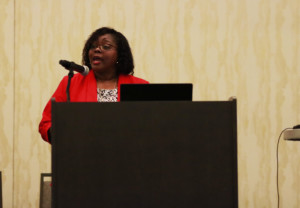Among the various opportunities to increase collaborative efforts between the College of Agriculture and Human Sciences Cooperative Extension Program (CEP) and the Cooperative Agricultural Research Center (CARC) during the joint conference, the “Building the case for trust” segment offered a unique perspective on the necessity of relying on one another to produce better work.
Prairie View A&M University Training and Organizational Development Manager for Human Resources, Patricia Williams, demonstrated how creating and maintaining trust among colleagues exponentially can boost an organization’s positive output.
Drawing tips from the leadership training company FranklinCovey, Williams outlined how trust among colleagues should be treated as a vital resource; when it’s plentiful, success abounds. But when it’s scarce, it can snowball into a deterioration of an organization’s efforts.
Knowing the qualities and integrity of your colleagues can build trust among your network and allow for a higher speed and volume of completed work. According to an excerpt from William’s presentation, “creating trust is the single most critical competency needed today – and creating it is a learnable skill. A function of character and competency, trust impacts everything we do as it relates to the speed and cost of doing business.”
Key takeaways from Williams’ presentation suggest that understanding how to create and build trust within your network will only allow positive impacts. Knowing your “why” behind your work will impact your “what” because it will provide a deeper purpose. The four core tenets of credibility include integrity, intent, capabilities, and results. When there are “trust taxes,” it’ll slow down your process. But “trust dividends” will speed up your success.
“I felt honored to be invited to speak at your joint state conference,” said Williams. “I was very impressed with how well thought out and organized the conference was. In addition, I was incredibly impressed with the holistic approach of the conference. The committee planned elements that focused on the whole person with knowledge & information, physical & fitness opportunities, and spiritual & motivational speakers. Kudos to the committee.”
Trust, of course, often depends on our behavior with each other. The way we view, speak, and treat one another is paramount to creating trust. Approaching trust as a verb (listening, communicating, solving) will help trust become a noun.
Pascale Mondesir
Communication Specialist II
pamondesir@pvamu.edu

